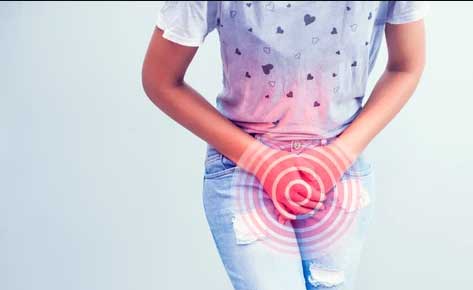
Have you ever experienced discomfort in your lower abdomen and the frequent urge to go the bathroom with painful and burning urination? If so, you may have experienced a urinary tract infection (UTI). Roughly 40% of women experience a UTI at some time, and in women, it is the most common bacterial infection1.
What is UTI?
A UTI occurs when bacteria enter the urinary tract, leading to an infection in the bladder, urethra, ureters (urine tubes) or kidneys2. About 80 to 90% of UTIs are caused by a type of bacteria called E. coli. that normally resides in your intestines but can sometimes get into the urinary tract1.
There are different types of UTI depending on where the bacteria go. A lower urinary tract infection occurs when bacteria gets into the urethra and is deposited up into the bladder. This is called cystitis. Infections that get past the bladder and up into the kidneys are called pyelonephritis3.
Symptoms of UTI
Some people may not experience any symptoms; however, most get at least one or more of the following4:
Treatment for UTI
Sometimes, a UTI can be self-limiting in women, meaning that the body can fight the infection without antibiotics. However, a small study has suggested early, mild UTI might clear up on their own. It's always best to check with your doctor if you are having UTI symptoms.
Most uncomplicated UTI cases can be treated quickly with a short course of oral antibiotics. But an early UTI, such as a bladder infection (cystitis), can worsen over time, leading to a more severe kidney infection (pyelonephritis). But the use of antibiotics can make the problem worse. Antibiotics kill not only the bad bacteria, but also the good bacteria that perform countless valuable natural functions in your body. These drugs do not help restore the healthy bacteria that was once there, thus encouraging further infection. Then yeast can overgrow and cause problems such as a vaginal yeast infection. However, there is a safe and effective alternative to antibiotics for people with UTIs – URICIL.
Take the Next Step in Fighting UTI

Introducing URICIL
URICIL is not an antibiotic, so there is no issue about resistance. It is powered by Turmeric, which has anti-bacterial, anti-inflammatory and antioxidant properties. URICIL also alkalises the urine. It is a scientific breakthrough that can help millions of people experience symptomatic relief from cystitis and reduce its occurrence.
If you suspect that you are suffering from UTI, carefully observe the symptoms you are experiencing. If they seem to get worse or do not respond to natural remedies, seek your doctor’s advice immediately.
Lala V, Minter DA. Acute Cystitis. [Updated 2019 Mar 14]. In: StatPearls [Internet]. Treasure Island (FL): StatPearls Publishing; 2019 Jan-. Available from: <https://www.ncbi.nlm.nih.gov/books/NBK459322/>
Drugs.com 2019, Medications for Urinary Tract Infections,
<https://www.drugs.com/condition/urinary-tract-infection.html>
Hooton, T.M., & Gupta, K. [Last updated July 24 2019], Acute complicated urinary tract infection (including pyelonephritis) in adults. UpToDate. April 1, 2019. Accessed June 3, 2019 <https://www.uptodate.com/contents/acute-complicated-urinary-tract-infection-including-pyelonephritis-in-adults>
Drugs.com 2018, Bladder Infection (Cystitis),
<https://www.drugs.com/health-guide/bladder-infection-cystitis.html>